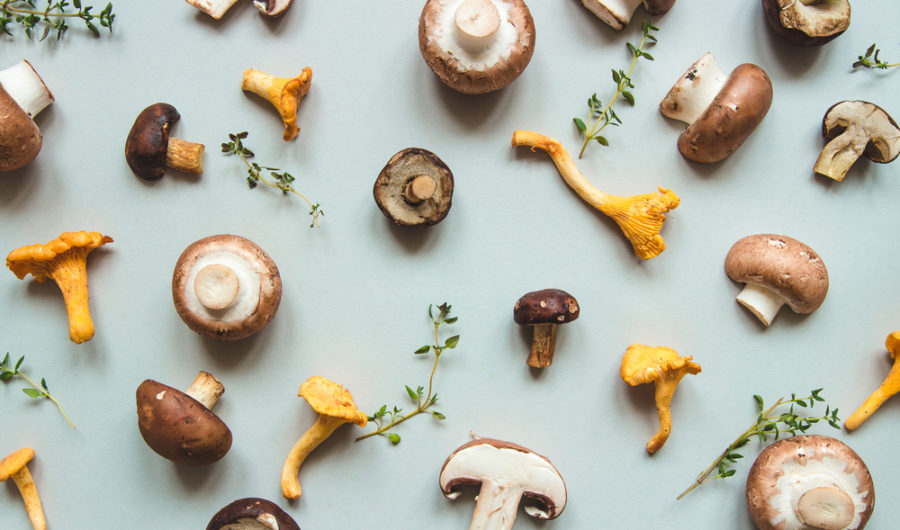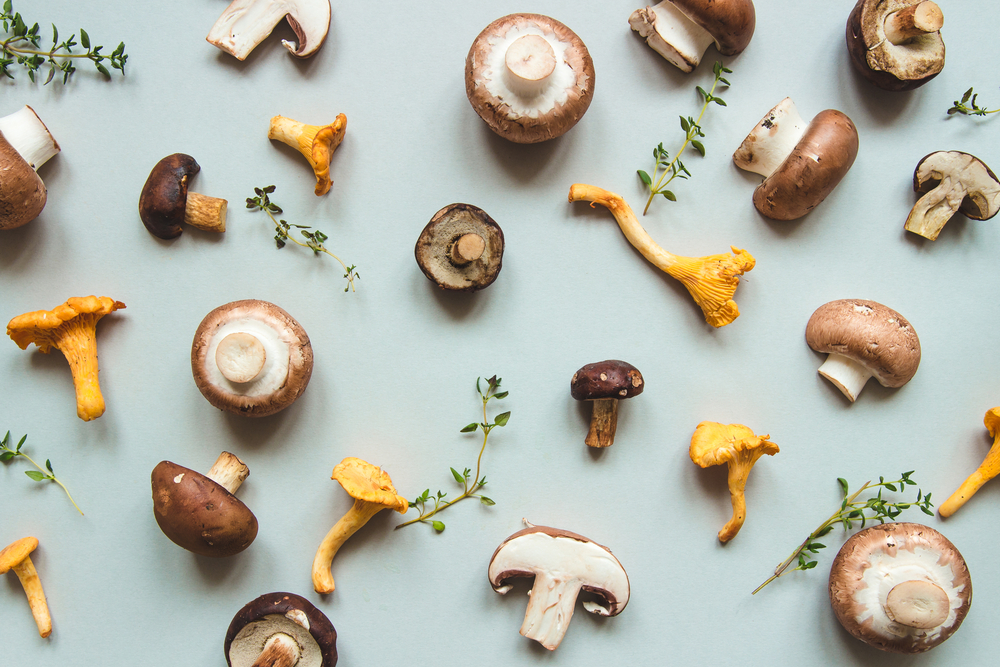Mushrooms may not be the first thing you think about as a natural aid to sleep, but research and health experts tell us otherwise.
“There are an estimated 1.5 million types of fungi, which have survived on earth for 100s of millions of years and have been used to support human health for a few thousand years. A number of mushrooms have properties that help modulate the human nervous and hormonal systems (key players in sleep and mood regulation). Based both on traditional use and growing scientific evidence, there are key mushrooms that have been shown to have active compounds that, when taken regularly or in the right doses, can support you in having a better night’s sleep. Certain mushrooms have specific compounds and therapeutic properties that are helpful to support a calm mind and good quality sleep. Two of the main mushrooms to consider are Reishi and Lion’s Mane. These have been used in traditional medicines for millennia and, more recently, recommended by holistic experts and even integrative doctors to improve sleep quality and quantity, especially when related to high levels of stress or low mood” says naturopath and mycotherapy expert, Hania Opienski.
Why are health professionals saying yes to mushrooms for sleep?
Although you won’t be finding your regular GP prescribing a course of mushrooms for sleep anytime soon, in many other countries around the globe, especially in Asian countries such as China, Tibet and Japan, these mushrooms have been recommended to people struggling with sleep for thousands of years and are still used in modern Asian medicinal systems.
Studies demonstrate that medicinal mushrooms, as well as having a significant immunomodulatory action, also have an adaptogenic effect, which means they help your nervous system adapt to stress. Adaptogens of various types are used in all-natural medicine traditions to help calm the mind, support the body in managing stress and promote a nervous system state where the body can rest and heal.
Though there are many herbal adaptogens and even sedative and hypnotic herbs (those that make you calm or sleepy, respectively), many of these can only be used short term, or cannot be used alongside numerous medications (and not just those prescribed for sleep). Mushrooms shine in this regard, as they are safe to be used long term and (as long as they are processed appropriately) can be used safely alongside most medications. As a functional food (as opposed to herbal medicine) they can also be recommended by nutritionists, which means they are available to be recommended as an effective tool by a broad range of health professionals.
How do they work?
Reishi is seen by many as the star mushroom for supporting the nervous system and sleep. It has a confirmed sedative effect, reducing anxiety and enhancing feelings of calm. There is evidence it can create drowsiness (a “hypnotic” effect) as well as extend both sleep time and sleep quality.
Reishi is also a potent antioxidant, which is important because research tells us that oxidative stress and anxiety levels are connected. A range of studies indicates that high oxidative stress levels can stimulate the stress response, and increase agitation and that anxiety-related conditions are associated with this imbalance.
The key active Reishi compounds that can support good sleep are triterpenoids, a group of compounds that have antioxidant, anti-inflammatory, pain-reducing and sedative effects. Choose products with guaranteed levels of triterpenes like ganoderic acids, like those produced by Hifas da Terra, to get these results.
Reishi has also demonstrated potential as a support for regulating mood and reducing the symptoms of depression and anxiety. This is thought to be due to the use of Reishi promoting optimum levels of serotonin (our key happy hormone) and its adaptogenic effect on chemical messengers that both modulate immunity and the central nervous system, particularly the stress response (HPA axis and cortisol levels).
Trials have shown that Reishi can help to enhance how quickly people fall asleep. Its use can also increase the duration of the non-REM light sleep phase without influencing the REM phase by stimulating the body’s benzodiazepine receptors, which are involved in modulating neurotransmitters that inhibit stimulating impulses reaching the central nervous system.
Lion’s Mane, on the other hand, helps improve sleep quality without making you drowsy. It is a safe nootropic that works to support sleep by calming the nervous system, reducing anxiety and boosting mood.
Lion’s mane also stimulates the vagus nerve and regulates the gut-brain axis. In digestive disorders, low mood or stress often makes symptoms worse, such as in IBS, which usually coincides with a dysregulation of the gut microbiota (intestinal flora). Compounds in Lion’s Mane can both help restore the balance of intestinal microbes, which as we know are linked to brain function, health and mood by the gut-brain axis, as well as helping to regenerate nervous tissue in both the enteric (digestive) and central nervous system.
Lion’s Mane contains interesting molecules called hericenones. These compounds are unique in their capability to promote neurogenesis (the formation of neurons), a process directly related to their antidepressant and anxiety-reducing effects. Scientific studies on hericenones show that they are neurotrophic and encourage the production of NGF (nerve growth factor), which helps the brain make more neurons for better memory and focus. There is emerging evidence they also have a nootropic effect and help promote BDNF (brain-derived neurotrophic factor), which supports cognition, mood, stress resistance and sleep, as well as helping control anxiety. For consistent results, look for products that state the exact amount of hericenones such as those made by Hifas da Terra.
Who can they benefit?
In this day and age, most people could do with an improved state of calm, clarity, mood and sleep, so unless you have a mushroom allergy or take certain medications, Lion’s mane and Reishi can support most people. The list of people who can benefit includes people who are stressed, those with anxiety, low mood, the overthinkers and perfectionists, the worriers, people who work out a lot, shift workers, busy parents, hyperactive or sensitive kids, or those with food sensitivities or concentration problems … basically, most people will get some benefit, whether it’s reducing your brain fog in the morning, helping maintain a sense of calm and clarity during the day, or helping you switch off and sleep more deeply or solidly at night.
Mushrooms are not just good for adults who need help with sleep, kids can safely take mushrooms too, they just need products dosed to their body weight (liquid forms are ideal like the Kid’s range from Hifas da Terra). These same mushrooms can help not just with calming down and improving sleep, but also improve focus, concentration, memory, mood and even neurological development.
What results can I expect?
A bedtime dose of Reishi can provide some short-term relaxing benefits and may improve sleep quality or sleep quantity on an ad hoc basis. However, for more chronic complaints regular use is needed for good effects. Results will vary from person to person depending on your state of health, and how severe your sleep issues are if you’re taking sleeping medications or have other conditions that are contributing to your sleep issues.
Medicinal mushrooms are adaptogenic functional foods that help the body maintain or return to balance or homeostasis. This includes having a normal sleep-wake cycle and restful sleep. How far your system is from this ideal set point will impact how quickly you see results and what dose you need to take and for how long. It’s ideal to work with a natural or integrative health practitioner to support you in finding the right protocol and dose for you. You can email Hifas da Terra for free advice on medicinal mushroom use for your health (or your clients or patients if you are a health professional) at [email protected].
Regular use of Lion’s mane and/ or Reishi will not only support improved sleep and nervous system health but also immunity and a host of other benefits including regulating inflammation in the body and protecting your cells from damage.
Anyone who can’t take them?
Luckily mushrooms are safe for just about everyone. The only absolute contraindication is a mushroom allergy, so if you can’t do culinary mushrooms, then unfortunately the same applies to medicinal mushrooms. There are a few cautions to consider and if you are taking any potent prescribed medications, it’s best to check with your health practitioner first.
If you are taking medications, it’s always good to double-check, but Hifas da Terra mushrooms have been third party tested by the Medina Foundation and found that these extracts will not significantly interact with most medications or change how the body uses and metabolises these (i.e. they are safe to be used alongside most medications).
However, medicinal mushrooms, though strictly speaking a food, do have potent effects and caution is advised if you are taking prescribed medication for a particular symptom and then want to take a mushroom that has similar effects. The key cautions are for medications for lowering blood sugar or for blood thinning while using Reishi extract (which can have these effects). We’d advise against using Reishi alongside strongly prescribed blood thinners such as Warfarin.
Though some people can be sensitive to culinary mushrooms if they are on a low lectin or low FODMAPS diet, these people can normally manage and get benefit from properly prepared mushroom extracts such as those produced by Hifas da Terra.
And though you may have been told otherwise if you have candida, you CAN use medicinal mushrooms, and there’s even some evidence that Reishi mushrooms can actually help you to get candida back in balance. In this case, it’s preferable to use a concentrated extract and to avoid whole mushroom powders, particularly Lion’s mane, as these are full of prebiotic fibre, which is great for feeding your good bacteria but may also feed the candida too.
How do we get our hands on them?
Lion’s mane is a wonderful culinary mushroom if you can get your hands on it, but it’s hard to find in the UK. Reishi is only used as a prepared powder, capsule or liquid. That’s why supplements are supportive for daily use and also provide a higher more consistent concentrated dose.
Be sure to look for high-quality brands such as Hifas da Terra, that use the best ingredients and production practices. It’s important to only consume organic mushrooms as they are chelators, which means they will absorb toxins and heavy metals from their environment. Choose 100% fruiting body (or 100% mycelium extracts that are not grown on grain) as opposed to full-spectrum biomass as the latter has a much lower concentration of actual mushroom and is likely to be made up of a large percentage of the grain that the mushrooms were grown on. It’s key to have standardised levels of active compounds for consistent results. Other certifications that indicate a quality supplement include organic, GMP (made to pharmaceutical standards), vegan, and halal are good to look for.
How do I take them and how often should I take them?
When you are taking mushrooms to help with an issue, taking a regular dose each day for a couple of months at least is recommended. If stress, anxiety or sleep issues are a chronic problem for you, the best results are achieved with consistent use over a period of time. Regular, daily use of Lion’s mane or Reishi on a daily basis can help to soothe your nerves and support a calm mind for easier sleep. A concentrated capsule such as the MicoSalud concentrated extract line by Hifas da terra (Mico-Leo for Lion’s mane or Mico-Rei for Reishi) is a good choice. Capsules can be taken in the morning for general all day nervous system support, or take Mico-Rei at night to help wind down.
Mushrooms are functional foods that are full of useful ingredients like prebiotic fibre, amino acids, peptides, minerals and vitamins which provide a whole host of other health benefits and can safely be taken for long term support.
There is also no risk of overdoing it or needing to keep consuming more and more to maintain the desired results. You can use them to manage stress, balance your nervous system, and keep your gut happy to avoid sleep issues. It’s kind of like asking, how long do I need to keep eating vegetables every day before I’ve had enough and can stop?
For a short-term fix to help you wind down, Reishi can even have a noticeable calming or soporific effect with one-off use at a higher dose. You can use a couple of capsules of a good quality Reishi extract at bedtime (15 x as concentrated as a whole powder), or a dessert spoon of Reishi Antiox powder in a hot cacao for those who are happy to have a bitter potion to send them off to sleep (or sweeten with a little date syrup for added sleep supporting benefits).
Lion’s mane helps balance your gut-brain connection and can support good sleep by harmonising your gut and promoting the production of mood-regulating neurotransmitters. As it doesn’t make you sleepy you can have it anytime during the day to calm the nervous system. Take a daily capsule or a whole powder if you want the prebiotic effects too. This can be mixed into a “mushroom latte”, added to soups or broth, or even a smoothie. Take daily for a few weeks, or long term for consistent mood and nervous system regulating effects.
words by Hania Opienski
READ MORE: Think Anxiety Is Wrecking Your Sleep? It Could Actually Be Your Blood Sugar…














